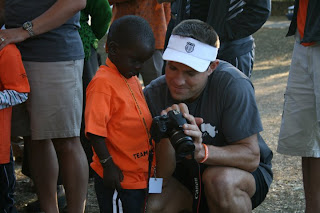World Vision uses funds
that have been donated or raised and uses them for programs that benefit
children and their communities. For example, one of the current programs in
Australia is titled KIDS HOPE AUS.
 |
| By Brittany Carlson (USAG Stuttgart) (United States Army) [Public domain], via Wikimedia Commons |
KIDS HOPE AUS. is a
mentoring program aimed at providing help with education and well-being for
Australians children in need.
There are thousands of Australian
children that need help with school work or their social life and could benefit
from one-on-one mentoring with a caring adult.
A partnership between
local churches and primary schools, KIDS HOPE AUS. works to provide support for
children in desperate need to improve their quality of life.
A mentor is present for an
hour each week, providing additional support with homework, as well as to play
games and other creative activities that the child might require. On top of
that, the mentor provides emotional and social support for the child so that
they aren't getting behind on their school work because of depression or
bullying.
On the website for the St
Stephen's Anglican Church in Bayswater, Victoria, it states that “Ainslie Ellis
is the coordinator for the program.
Ainslie recruits and trains the mentors, provides ongoing support for
mentors and is the liaison point with the school. She also identifies prayer partners for each
mentor and child.”
As well as a mentor, the
church provides a ‘prayer partner’ for each mentor and child. ‘Prayer partners’
are used to guide children in their lives as well as to pray for their health
and well-being and provide additional support for each child and mentor.
According to the WorldVision Australia website, “Children who receive help early on, especially those
considered vulnerable and at-risk, significantly improve their chances for a
good education, health and well-being, and social competence.”
This is very true as many
children lack proper relationships with adults other than their parents. They
need these relationships to improve their ability to communicate with others
and to create other important relationships with family, friends or colleagues
in the work place. Without these relationships, the individual would suffer and
be unable to do normal everyday things.
The Anglican Diocese ofMelbourne is an example of a community supporting KIDS HOPE AUS. From their
website, they have a heart-warming example of how KIDS HOPE AUS. has changed
lives.
“Nine year old Anna had not spoken
to an adult for more than two years – not her foster parents, teacher, school
specialists or relatives.
Anna was referred to the KIDS HOPE
mentoring program and matched with Hilda, a mature aged grandmother. Hilda was briefed
about Anna’s elective mutism with adults, but was keen to accept the challenge
of building a relationship with this troubled little girl.
Eight weeks after the mentoring
sessions began, the principal walked past the alcove where Hilda and Anna met
each week. Imagine her surprise as she observed Anna talking animatedly to her
mentor and friend, Hilda!”
There are mentoring spots
available all over Australia. Being a mentor can make a difference not only in
a child’s life but also in your own life because of this rich and exciting
opportunity that will teach both mentor and child how to cope with the stresses
of everyday life while creating a firm bond between each pair.
Do you have the caring
attitude to help a child reach their full potential? Do you have the ability to
be a positive role model? Do you have an hour a week to spare so you can change
a child’s life for the better?
However, if you don’t have
the time to be a mentor, there are other ways you can help out the program or
World Vision itself. You can donate money as well as books, games and craft
products to improve the life of children in need. It’s only a small thing that
won’t take up much time. Just do what you can, even the small things count.


